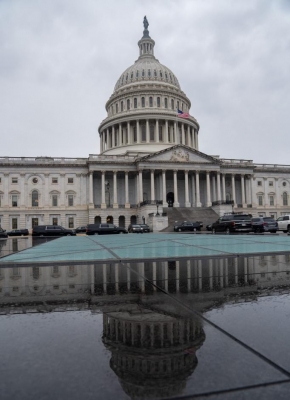Biden described the talks as “productive” even though House Speaker Kevin McCarthy said “didn’t see any new movement”…reports Asian Lite News
President Joe Biden and congressional leaders confronted each other on the debt limit impasse Tuesday, ending their meeting with no breakthrough but agreeing to meet again this week to try to avert the looming risk of an unprecedented government default.
Speaking at the White House, Biden described the talks as “productive” even though House Speaker Kevin McCarthy said after the high-stakes Oval Office meeting that he “didn’t see any new movement” toward resolving the stalemate.
Lawmakers and their staffs were to continue discussions on the annual federal budget at Biden’s encouragement. Biden and the congressional leaders are to meet again Friday.
After the hourlong discussion in the Oval Office, Biden said he was “absolutely certain” that the country could avert a default, declaring that failure to meet America’s obligations “is not an option.”
Still, time is short. The government is bumping up against its legal limit for borrowing and will not be able to pay all of its bills as soon as June 1 if Congress doesn’t agree to raise the debt ceiling. That failure would send the country into default with wide-reaching economic impact at home and around the world.
Republicans came to the White House hoping to negotiate sweeping cuts to federal spending in exchange for allowing new borrowing to avoid default. Biden, on the other hand, reinforced his opposition to allowing the country’s full faith and credit to be held “hostage” to negotiations — while affirming his willingness to hold talks on the budget only after default is no longer a threat.
“I told congressional leaders that I’m prepared to begin a separate discussion about my budget, spending priorities, but not under the threat of default,” Biden said.
Outside the White House, McCarthy said, “I asked the president this simple question: Does he not believe there’s any place we could find savings?”
As the president welcomed McCarthy, House Democratic leader Hakeem Jeffries, Senate Majority Leader Chuck Schumer and Minority Leader Mitch McConnell, he quipped to reporters, “We’re going to get started, solve all the world’s problems.”
Biden later described the meeting’s tone as “very measured and low-key,” adding, “Occasionally there would be a little bit of an assertion that maybe was a little over the top from the speaker.”
He especially took issue with McCarthy’s branding as a lie the Democrats’ assertion that the Republicans’ budget restraints would hurt veterans.
Still, Biden added, “I trust Kevin will try to do what he says.”
There seemed to be at least a bit of daylight between McConnell, who has let his House counterpart take the lead in negotiations and backed him up ahead of the White House meeting, and McCarthy.
The Senate leader said: “The United States is not going to default. It never has and it never will.” The speaker, though, simply said, “I’ve done everything in my power to make sure we will not default.”
Democrats said there is room to “come together” on spending cuts as part of the budget process, but quickly jumped on McCarthy’s refusal to rule out the possibility of default, with Schumer saying the Republican is “greatly endangering America.”
“To use the risk of default, with all the dangers that has for the American people, as a hostage and say it’s my way or no way, are mostly my way or no way, is dangerous,” Schumer said.
McCarthy said Biden had directed their staffs to continue discussions, and said the leaders themselves would convene again in person Friday at the White House.
While Biden ruled out default, he also all but dismissed trying to unilaterally prevent it. He said he didn’t believe invoking the 14th Amendment of the U.S. Constitution, which says the validity of the federal debt shall not be questioned, was a solution to the current impasse.
White House lawyers will pursue the idea further, he added, but “the problem is it would have to be litigated.”
Before the White House meeting, both McCarthy and White House press secretary Karine Jean-Pierre insisted it would be simple to avert default — if only the other side capitulated.
The chasm between these opposite postures had fomented uncertainty that is roiling financial markets and threatens to turn into a tidal wave that swamps the country’s economy. Default, officials say, threatens to disrupt Social Security payments to retirees, destabilize global markets and tilt the nation into a potentially debilitating recession.
Last month, House Republicans passed a sweeping bill to slash spending, an opening offer in negotiations. But that legislation has no chance in the Democratic Senate and the White House has threatened to veto it. Republicans hope that bill would achieve $4.5 trillion in deficit savings through cuts in spending, eliminating tax breaks for investing in clean energy, and reversing Biden’s plans to reduce the burdens of student loan debt.

Leave a Reply